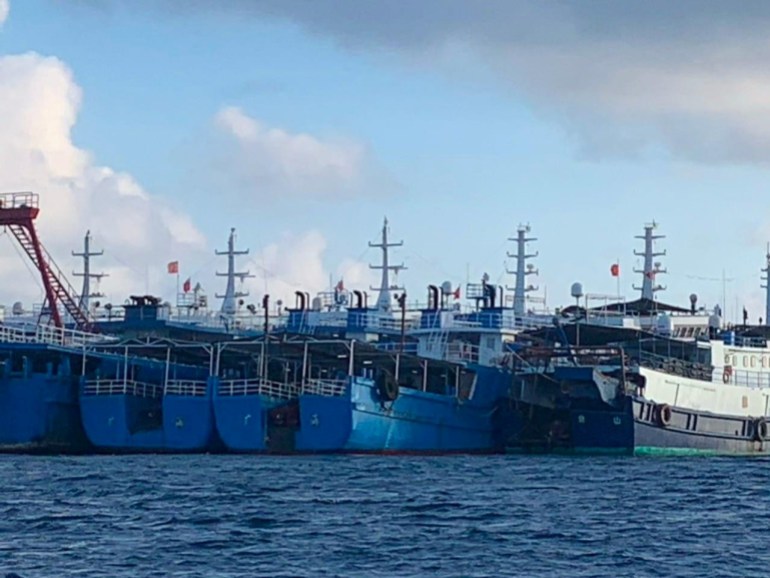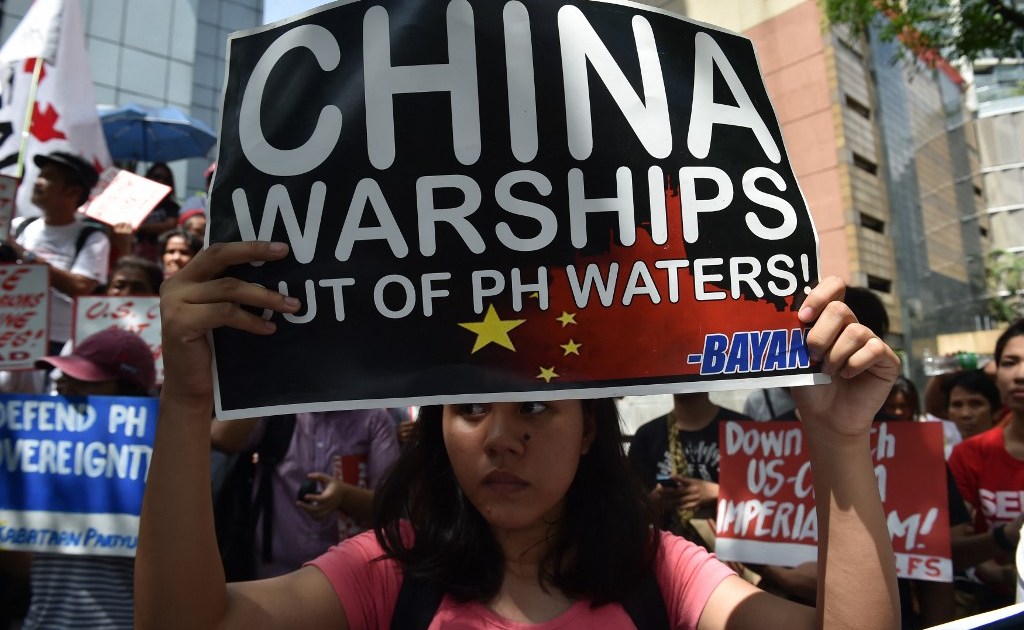Beijing’s South China Sea claims ‘gravely undermine’ rule of law | South China Sea News
China’s activities in the South China Sea, including its “historic claims” on almost all parts of the vital trade route “gravely undermine the rule of law” in the oceans and universally-recognised provisions in international law, the US has concluded in a new report.
The US State Department said in a report published on Wednesday that the overall effect of Beijing’s claims was that it “unlawfully claims sovereignty or some form of exclusive jurisdiction over most of the South China Sea”.
“For this reason, the United States and numerous other States have rejected these claims in favor of the rules-based international maritime order within the South China Sea and worldwide.”
The report, entitled Limits in the Seas, said that aside from its lack of “substantive content”, China’s declaration of “historic rights” over the 3.5 million sq km (1.35 million sq mile) sea “is deficient for its vagueness”.
“The PRC has stated that its historic rights are ‘protected by international law,’ but it has not provided a legal justification for such a claim,” the report said referring to the country by its official name, the People’s Republic of China (PRC).
China cites its so-called “nine-dash-line” to assert its rights over the entire South China Sea.
An international tribunal in The Hague declared the claim to have “no legal basis” based on the UN Convention on the Law of the Sea to which Beijing is a signatory, after the Philippines, which also claims parts of the South China Sea, brought legal action against Beijing.
Washington has been stepping up its rhetoric and diplomatic efforts challenging Beijing on several issues, including questioning the reported mass detention of Muslim Uighurs in Xinjiang as well as the passage of the national security law in Hong Kong, since Joe Biden took office as president a year ago.
It has also dispatched several aircraft carriers and battleships to assert “freedom of navigation” rights in the South China Sea, while also consolidating its alliances with other regional powers such as India, Japan and Australia through the Indo-Pacific Quad group.
Rival claims
Aside from China, parts of the South China Sea are also claimed by Taiwan as well as neighbouring countries such as the Philippines, Vietnam, Brunei and Malaysia.
In recent years, China has ramped up its military presence in the region building artificial islands and air bases, where it has installed missile systems and other equipment.
China’s so-called maritime militia has been deployed, and stands accused of “harassing” fishermen from the Philippines and “swarming” parts of the sea within Manila’s exclusive economic zone. In October, Malaysia accused China of “encroaching” into its seas.
Those activities have turned the resource-rich regional waters into a potential flashpoint, threatening to disrupt as much as $5 trillion in global trade.
The latest State Department report also questioned China’s claims of “sovereignty” over more than 100 features in the South China Sea that are submerged below the surface at high tide.
“Such claims are inconsistent with international law, under which such features are not subject to a lawful sovereignty claim or capable of generating maritime zones such as a territorial sea,” the report said.
 Chinese vessels, believed to be crewed by Chinese maritime militia personnel, were seen at Whitsun Reef within the Philippine exclusive economic zone in April 2021 [Philippine Coast Guard via Reuters].
Chinese vessels, believed to be crewed by Chinese maritime militia personnel, were seen at Whitsun Reef within the Philippine exclusive economic zone in April 2021 [Philippine Coast Guard via Reuters].China has been using claims of sovereignty over such features to either draw or assert the right to draw, “straight baselines” and claim territorial waters.
The US says “none of the four ‘island groups’ claimed by China” in the South China Sea has met the geographic criteria for using straight baselines under the Convention.
“There is no separate body of customary international law that supports the PRC position that it may enclose entire island groups within straight baselines,” the report said.
It is also “not permitted by international law” for China to assert claims to internal waters, a territorial sea, an exclusive economic zone, and a continental shelf “that are based on treating each claimed South China Sea island group as a whole”.
“Within its claimed maritime zones, the PRC also makes numerous jurisdictional claims that are inconsistent with international law,” the report said.
China has yet to respond to the report but it has repeatedly rejected The Hague’s 2016 ruling rejecting the “nine-dash-line”, while insisting on its “historic rights” over the South China Sea.
In the past, it has said that its military presence in the South China Sea is “entirely for the purpose of self-defence”, and that it has no intention to “seek hegemony” or “establish spheres of influence” in the region.






Pingback: turners outdoorsman
Pingback: 티비위키
Pingback: have a peek here